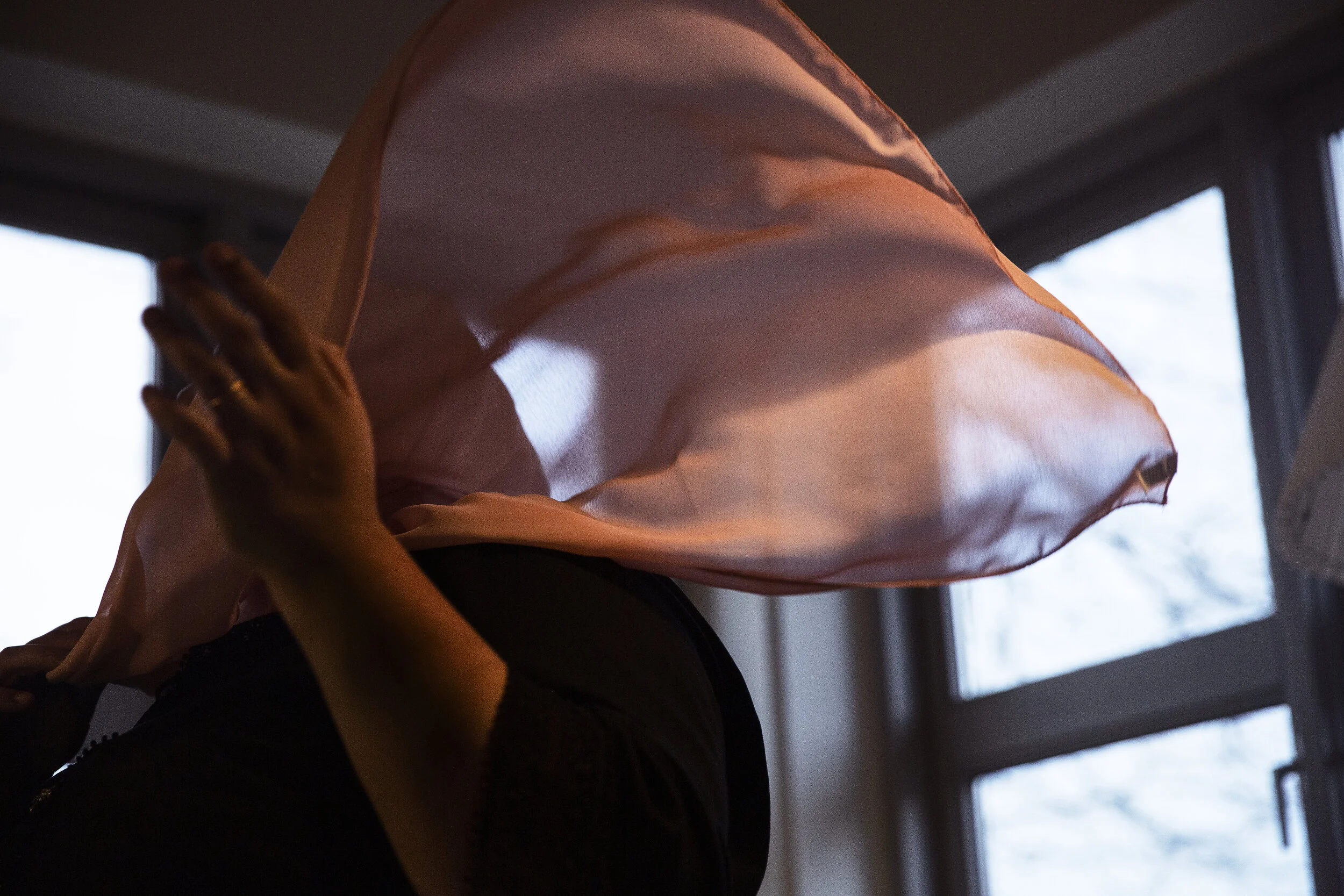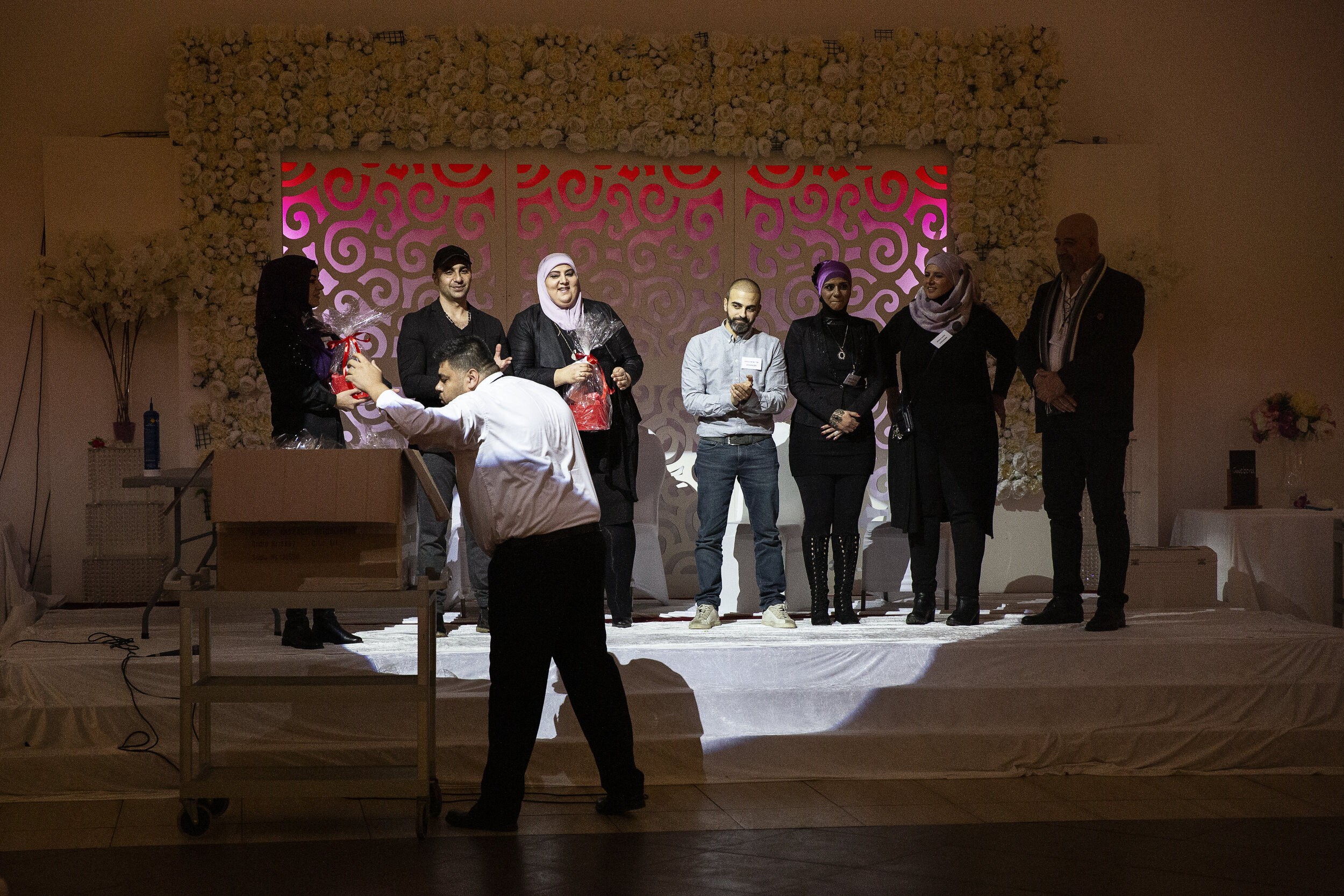
Always There.
She uses her life experiences— as an immigrant, woman, mother, and Danish citizen— to do what she can to help others.
After becoming involved in multiple social programs in the community, Randa Radwan has found herself becoming a pillar of support for her community.
Randa laughs at a comment after presenting an event at the weekly Bydelsmødre meeting.
The sun has already begun to set when Randa gets into her car. She was in meetings all day creating a camping retreat for local families, and now she can pick up her youngest, Rasha, 4, and head home for a rare, relaxing night.
Then she gets a call; Mohammed, 8, lost his shoes and cannot take the bus home. With both children buckled in the back, Randa puts the car in gear and pulls away from the school toward City Vest. She doesn’t get more than a block away when, as she stops at an intersection, her middle daughter comes walking around the street corner. Faten, 12, excitedly squeezes in the back seat of the car with her younger siblings, happy for the chance encounter.
After purchasing new boots and enjoying some pre-dinner ice cream cones, they return to their apartment.
As Randa makes shawarma wraps (making sure to make two for her oldest children who are not home yet), her husband, Ali, tickles Rasha and lets Mohammed win at arm wrestling and UNO.
Life in Denmark is a good life, says Randa, who has lived in Denmark for 30 years. The mother of five is raising all her children in Gellerup, a neighborhood just outside of Aarhus.
When she was eleven, Randa’s family immigrated to Denmark from Dubai. The transition was difficult. Despite learning danish and being a citizen, she did not feel fully accepted by the Danes but she also felt alienated from the Arabic community her Palestinian heritage ties her to.
Randa finishes some work after a meeting.
Randa visits her best friend, Ghada.

Above: Randa, Rasha and Mohammed leave Rasha’s kindergarten.
Randa driving her mother to the airport.
By watching her parents, Randa learned the value of hard work. Her mom took care of Randa and her siblings, driving them on the weekends to see their father whilst he was working out of town. She also worked, and when the social worker controlling her commune support gave her the option to either take a job in a pig slaughterhouse or not get the week’s money, her mom did all she could to not be dependent on the government.
Randa is proud to say she is a strong woman and she is quick to credit her mom. When she was 18, Randa married her cousin and moved to Palestine. After growing up in Denmark, she found she could not live in Arabic countries as it was too restricting and she was too strong a woman.
She divorced her husband and returned to Denmark, pregnant with her first child.
Despite the stigma against divorced women in her culture, Randa found Ali. They married but still faced problems being together due to the bureaucratic process with Ali’s visa. He returned to Lebanon, having to leave Randa and their growing family. After Taysir, who is now 14, was born, Randa moved so the family could be together in Lebanon. Once again, the culture was too restricting for her but she felt conflicted because she saw how much Ali loved being with his children. Not out of want, but for her sake, Ali told her to move back to Denmark but she stayed. Luckily, his visa came through in a few months and they were allowed to settle in Aarhus.
Rasha, Faten, and Mohammed eat ice cream cones with their mom in City Vest before dinner.

Above: Randa preparing for a campaign.
“It has been a hard life,” Randa said. Because Randa is an immigrant, she sometimes feels her struggles and wishes to improve her life are dismissed. For example, Ali cannot work because he did not complete Danish classes within his first two years being here due to health problems. These classes are incredibly expensive and the family can’t afford them right now. The government aid they do get go toward the family's three bedroom apartment, food, and school necessities and they do not have savings. But some say they should be happy that they are even here.
Randa says that it was hard for her to come to Denmark and she hoped it would be better for her kids, who were all born here. But it’s not. In fact, as
the refugee crisis spreads throughout Europe, integration for immigrants and their children has become more challenging. This is especially true for non-western immigrants and women according to a study conducted by Economists Without Borders in 2016.
Randa uses her experiences as an immigrant, mother, and resident of Gellerup to help others in the community. It keeps her busy but Ali is a supportive husband (Randa describes him as a very good man) but he does tell Randa she should slow down and take care of herself sometimes. Despite the toll her busy schedule can take on her, Randa finds it makes her happy and brings her purpose.
Randa poses for a portrait.
After the laughing gas awareness campaign, Randa hugs two of the other coordinators.

Above: Randa and the other organizers are recognized for their work on the laughing gas awareness campaign.
Ali, Mohammed, Faten, Rasha, Sherin, Randa, and Taysir.
One day, when Ali urges her to skip her afternoon meetings after she was not feeling well in the morning, Randa assures him she will not go. Ali leaves for the evening and Randa gets dressed and does her makeup, telling her kids not to tell their dad she left for the meeting. She times it perfectly, gets home and changes back into the clothes she was wearing, and is watching a movie with the kids on the couch when Ali gets home.
He asks if she went to the meeting.
She says “no, no my dear.”
He asks, “are you sure?”
She says “yes!”
He then lightheartedly tells her she did not take off her eye makeup. Caught.
She laughs as she retells the story the next day, folding laundry before heading off to a day full of errands and meetings.
Ali plays with Rasha after kindergarten.
After dropping Rasha at kindergarten, a typical day is filled with meeting after meeting. She is trained as a Bydelsmor (neighborhood mom) and works with isolated women, particularly immigrants, in the community to help them integrate into Danish society. She represents Rasha’s kindergarten on the local school board, in addition to the four other committees she serves on. She begins initiatives to address concerns in the community such as the campaign to bring awareness to parents and teens about the dangers of using laughing gas to get high. Somehow, Randa also finds time to do grocery shopping and errands as well as visit her mom or friends between meetings.
Randa’s eldest, Sherin, 18, watched her mother work over the years and it gave her perspective on the opportunities available in Denmark and recognition that society can still develop. “She is my biggest inspiration and (her work) has made me so extremely proud of her.”
Rasha helps clean up after dinner.

Above: Randa takes a moment for herself on the balcony of her mother’s apartment, overlooking Gellerup.









